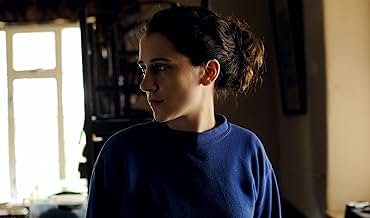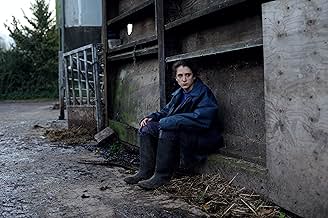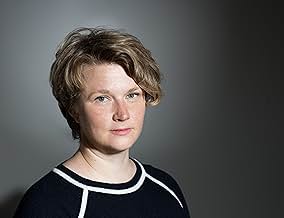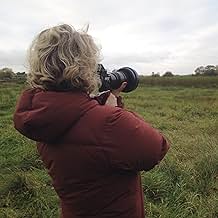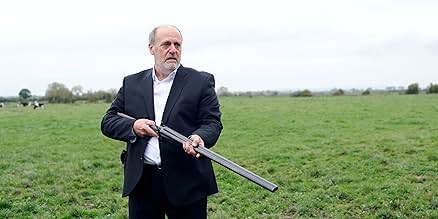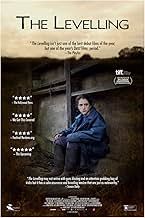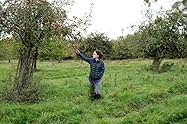VALUTAZIONE IMDb
6,4/10
2880
LA TUA VALUTAZIONE
Aggiungi una trama nella tua linguaTrainee vet Clover Catto revisits family farm after brother's suicide. Confronts father over farm's disrepair and brother's death, uncovering family secrets and childhood revelations.Trainee vet Clover Catto revisits family farm after brother's suicide. Confronts father over farm's disrepair and brother's death, uncovering family secrets and childhood revelations.Trainee vet Clover Catto revisits family farm after brother's suicide. Confronts father over farm's disrepair and brother's death, uncovering family secrets and childhood revelations.
- Premi
- 3 vittorie e 6 candidature totali
Recensioni in evidenza
A young woman (Kendrick) returns to the family farm after many years, due to tragedy -- her lone brother's apparent suicide -- and grapples with a difficult situation and a combative relationship with her father.
A very British film to me: fine performances from both Kendrick and Troughton both controlled and realistically playing their parts, moody well-shot rural scenes providing some atmosphere to the bleak world: yet also one exhaustively dour, thin on plot, drama.
It's clearly sincere in the portrayal of the realities of modern farming and rural life, which may well be it's main drive alongside the similar-yet-different father\daughter relationship, but this left me cold.
A very British film to me: fine performances from both Kendrick and Troughton both controlled and realistically playing their parts, moody well-shot rural scenes providing some atmosphere to the bleak world: yet also one exhaustively dour, thin on plot, drama.
It's clearly sincere in the portrayal of the realities of modern farming and rural life, which may well be it's main drive alongside the similar-yet-different father\daughter relationship, but this left me cold.
This review of The Levelling is spoiler free
**** (4/5)
THERE ARE ONLY a handful of directors who have portrayed the true beautiful brutality of a British farmland society, a notable tick to The Witch which had a compelling story about a young witch it also had stunning cinematography - gloomy at times but thanks to this it captivated the beauty of it all. Once released it wouldn't take long for another director to follow in its footsteps.
These footsteps are followed by first-time writer-director Hope Dickson Leache, with her film The Levelling a stunningly brutal tale of a young woman who is forced to move back to her old life on a farm due to a hard loss in the family. It's hard to find an actor who can pull this off successfully, Leache found what she was looking for with Ellie Kendrick who plays her female lead, who also carries the film. Kendrick plays Clover Catto a young veterinarian trainee who is forced to live on a farm due to the loss of her younger brother, not too long after the floods of October 2014. As soon as she arrives at the place she hasn't been to in years, she feels a sense of hardship which, until her father Aubrey (David Troughton), arrives.
Dealing with him the man who told her to leave, to do what she wants at a young age, she hates him he plagues her with emotional torture and asks her to do work around the farm, this leads her to ask questions about what really happened to her brother. Aubrey calls it an accident; however, Clover isn't so sure, seemingly wanting to play detective searching for evidence around the site, putting her father's grief to the test. There's a heavy sense of guilt to him too, Clover takes this to her advantage and starts to surround him with questions - perhaps leading him to answer her.
Given Leache's direction, the film takes this all in hand captivatingly proving strength with its female lead but forgetting one initial detail - the cumulative impact. The Levelling gives us the emotional heft of dealing with death, a sense of place, and deep depression of older family members it's her father that feels the brunt of the grief, he always refers to better time and refuses to show emotion especially when Clover comes to the investigative moment that he may be involved. This is the main flaw.
A patchy flaw that's fixed by the film's nigh perfect premise, the flawless performances, the excellent screenplay and Leache's gentle, yet beautiful direction which flows. The Levelling isn't just one of the best debuts of recent years it's one of the best British films of recent years period.
VERDICT: Kendrick is fantastic in a toughly heart-warming British directorial debut, that's gently crafted by a pure modest scale of the countryside and a beautifully atmospheric tale.
**** (4/5)
THERE ARE ONLY a handful of directors who have portrayed the true beautiful brutality of a British farmland society, a notable tick to The Witch which had a compelling story about a young witch it also had stunning cinematography - gloomy at times but thanks to this it captivated the beauty of it all. Once released it wouldn't take long for another director to follow in its footsteps.
These footsteps are followed by first-time writer-director Hope Dickson Leache, with her film The Levelling a stunningly brutal tale of a young woman who is forced to move back to her old life on a farm due to a hard loss in the family. It's hard to find an actor who can pull this off successfully, Leache found what she was looking for with Ellie Kendrick who plays her female lead, who also carries the film. Kendrick plays Clover Catto a young veterinarian trainee who is forced to live on a farm due to the loss of her younger brother, not too long after the floods of October 2014. As soon as she arrives at the place she hasn't been to in years, she feels a sense of hardship which, until her father Aubrey (David Troughton), arrives.
Dealing with him the man who told her to leave, to do what she wants at a young age, she hates him he plagues her with emotional torture and asks her to do work around the farm, this leads her to ask questions about what really happened to her brother. Aubrey calls it an accident; however, Clover isn't so sure, seemingly wanting to play detective searching for evidence around the site, putting her father's grief to the test. There's a heavy sense of guilt to him too, Clover takes this to her advantage and starts to surround him with questions - perhaps leading him to answer her.
Given Leache's direction, the film takes this all in hand captivatingly proving strength with its female lead but forgetting one initial detail - the cumulative impact. The Levelling gives us the emotional heft of dealing with death, a sense of place, and deep depression of older family members it's her father that feels the brunt of the grief, he always refers to better time and refuses to show emotion especially when Clover comes to the investigative moment that he may be involved. This is the main flaw.
A patchy flaw that's fixed by the film's nigh perfect premise, the flawless performances, the excellent screenplay and Leache's gentle, yet beautiful direction which flows. The Levelling isn't just one of the best debuts of recent years it's one of the best British films of recent years period.
VERDICT: Kendrick is fantastic in a toughly heart-warming British directorial debut, that's gently crafted by a pure modest scale of the countryside and a beautifully atmospheric tale.
Carson Robison sang it, farming is not for the faint-hearted. "The cow's gone dry and the hens won't lay, troubles pile up day by day. Grief and misery, pains and woes, debts and taxes, and so it goes."
There are parts of the world where farm output is measured in thousands of litres per week, but these rain-soaked acres in England ain't it. The flood of a few months ago made things a lot worse, but was this a viable dairying unit in the first place? Get rid of those cows, cut in some PVC field drainage with geotextile. Barley is used to make alcoholic beverages, muesli contains lots of oats.
Agriculture, emotional attachment, strained relationships and mental health issues - maybe they used to go together, but this combination was coming to rely increasingly on subsidies from the European Union. Is "The Levelling" about farming, or is it about a dysfunctional family who live on a farm? The technology doesn't seem to be much advanced on what was available in the 1930s. In this twenty-first century the cold-blooded business of converting soil fertility and sunshine into milk solids and butterfat entails zapping barcodes on ear-tags, uploading iPad data into laptops, and responding to endless on-line demands from government departments for information. And taxes.
In this film, family is everything, but when members of a family fall out, they're quite likely never to speak to each other again. We're simply expected to accept this dynamic, like it's a raw Scandinavian saga. It's something to do with the unforgiving land, and the malicious weather.
Aubrey the father (David Troughton) hands over the farm to his son to manage. Surely a poisoned chalice. Then the son kills himself. Clover (Ellie Kendrick) is about to complete her university qualifications in veterinary science, but she has to come back - to sort stuff out? Too many things don't make enough sense. The viewer is expected to fill in causes and effects. A cryptic crossword with ambiguous clues.
I hope "The Levelling" doesn't put young Britishers off farming. But you gotta love the land. Love it enough to compensate for the fact that the land does not love you. The land would rather be covered in forest, with squirrels and badgers.
There are parts of the world where farm output is measured in thousands of litres per week, but these rain-soaked acres in England ain't it. The flood of a few months ago made things a lot worse, but was this a viable dairying unit in the first place? Get rid of those cows, cut in some PVC field drainage with geotextile. Barley is used to make alcoholic beverages, muesli contains lots of oats.
Agriculture, emotional attachment, strained relationships and mental health issues - maybe they used to go together, but this combination was coming to rely increasingly on subsidies from the European Union. Is "The Levelling" about farming, or is it about a dysfunctional family who live on a farm? The technology doesn't seem to be much advanced on what was available in the 1930s. In this twenty-first century the cold-blooded business of converting soil fertility and sunshine into milk solids and butterfat entails zapping barcodes on ear-tags, uploading iPad data into laptops, and responding to endless on-line demands from government departments for information. And taxes.
In this film, family is everything, but when members of a family fall out, they're quite likely never to speak to each other again. We're simply expected to accept this dynamic, like it's a raw Scandinavian saga. It's something to do with the unforgiving land, and the malicious weather.
Aubrey the father (David Troughton) hands over the farm to his son to manage. Surely a poisoned chalice. Then the son kills himself. Clover (Ellie Kendrick) is about to complete her university qualifications in veterinary science, but she has to come back - to sort stuff out? Too many things don't make enough sense. The viewer is expected to fill in causes and effects. A cryptic crossword with ambiguous clues.
I hope "The Levelling" doesn't put young Britishers off farming. But you gotta love the land. Love it enough to compensate for the fact that the land does not love you. The land would rather be covered in forest, with squirrels and badgers.
10dochito
Awesome script, awesome actors, pretty sad story, so well done.
Excellent.
Clover, a veterinary student returns to the family farm following a bereavement in the family. Her father is struggling with grief over far more than this latest loss, having given up a military career to take over the farm decades earlier.
Death stalks the story as Clover's relationship with her father, mother, brother and even family dogs is explored. I almost had a feeling of in amongst the action, learning about real people through meeting them and picking up pieces of the jigsaw from each in turn. The story is so convincing that I could imagine it being filmed sequentially, with the actors learning plot twists just as we do.
Watching critically, there were perhaps two occasions when characters reacted in ways I had not expected, but I realised that they were correct and it was my anticipation that was wrong. Every revelation was something long known about but ignored or repressed. The jolt of parts falling into place was tangible; not just Clover but Aubrey and James too made discoveries about themselves and others around them.
There was minimal theatricality. Characters came and went with no introductions or explanations. Helen's character was a tiny joy, a gem of a part. The weakest character was the vicar arranging the funeral. I understand why it was necessary, but I would expect her to lead parishioners to their own conclusions, not trot out some amateur psychology. Her limited screen time would have had to be much longer to accommodate that.
Death, mud, decay, rain and stoic acceptance of tragedy run as constant themes. Images of hares play the role performed by background music in lesser films, with one swimming, then sinking lifelessly, only for the closing shot to be a hare running in the inevitable rain. No easy answers in this film, but an astonishingly brave exercise in respecting the audience to fill gaps rather than having the script explain everything.
I would be interested to know whether Hope Dickson Leach had the idea already and the real flood was a fortuitous coincidence, whether it was a hastily put together (probably largely improvised) story in response to the damage, or some other combination of theme and natural circumstance.
Death stalks the story as Clover's relationship with her father, mother, brother and even family dogs is explored. I almost had a feeling of in amongst the action, learning about real people through meeting them and picking up pieces of the jigsaw from each in turn. The story is so convincing that I could imagine it being filmed sequentially, with the actors learning plot twists just as we do.
Watching critically, there were perhaps two occasions when characters reacted in ways I had not expected, but I realised that they were correct and it was my anticipation that was wrong. Every revelation was something long known about but ignored or repressed. The jolt of parts falling into place was tangible; not just Clover but Aubrey and James too made discoveries about themselves and others around them.
There was minimal theatricality. Characters came and went with no introductions or explanations. Helen's character was a tiny joy, a gem of a part. The weakest character was the vicar arranging the funeral. I understand why it was necessary, but I would expect her to lead parishioners to their own conclusions, not trot out some amateur psychology. Her limited screen time would have had to be much longer to accommodate that.
Death, mud, decay, rain and stoic acceptance of tragedy run as constant themes. Images of hares play the role performed by background music in lesser films, with one swimming, then sinking lifelessly, only for the closing shot to be a hare running in the inevitable rain. No easy answers in this film, but an astonishingly brave exercise in respecting the audience to fill gaps rather than having the script explain everything.
I would be interested to know whether Hope Dickson Leach had the idea already and the real flood was a fortuitous coincidence, whether it was a hastily put together (probably largely improvised) story in response to the damage, or some other combination of theme and natural circumstance.
Lo sapevi?
- QuizOn the BBC News channel review of the year in film in 2017, critic Mark Kermode named this as his favourite British film of the year.
- BlooperWhen they are preparing to eat shepherd's pie, Aubrey says 'Do you want a drink James?' but when James refuses Aubrey says 'Oh come on Harry. Don't be such a girl.'
- Colonne sonore13 Angels Standing Guard 'Round The Side of Your Bed
Performed & written by Thee Silver Mt Zion (as A Silver Mt. Zion)
Published by Rough Trade Records
Courtesy of Constellation
I più visti
Accedi per valutare e creare un elenco di titoli salvati per ottenere consigli personalizzati
- How long is The Levelling?Powered by Alexa
Dettagli
Botteghino
- Budget
- 1.000.000 £ (previsto)
- Lordo Stati Uniti e Canada
- 3040 USD
- Fine settimana di apertura Stati Uniti e Canada
- 160 USD
- 26 mar 2017
- Lordo in tutto il mondo
- 118.451 USD
- Tempo di esecuzione1 ora 23 minuti
- Colore
- Proporzioni
- 2.35 : 1
Contribuisci a questa pagina
Suggerisci una modifica o aggiungi i contenuti mancanti

Divario superiore
By what name was The Levelling (2016) officially released in India in English?
Rispondi



